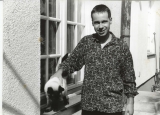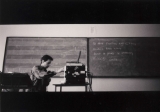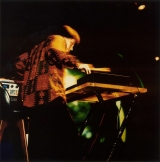
The circumstances for this meeting with Lukas Ligeti could have hardly been more unfavorable. On his stopover in Vienna, he found out that all his luggage was lost and that, in terms of density and tenaciousness, the Viennese evening rush hour traffic is barely any better than in his home city New York. Too late and slightly confused, as it should be for an outstanding composer, and with no spare clothes, he finally arrives at the café of our meeting. However, even under the stress of the last few hours, his enthusiasm for African music doesn’t seem to have suffered.
“Imagine, two vibraphonists sitting opposite to each other,” he begins. “The second player takes on the tempo of the first, but both have not agreed on who sets the beat. At the same time however, they play so fast and precise that we as listeners can no longer distinguish one melody from another, and the human brain begins to split up what it hears into single frequency ranges.” He notices my puzzled look and continues, “the fact that it is possible to play together without an agreement about who sets the time was an incredible insight and taught me how to deal with Ugandan music.” In general, African music, so the words of Ligeti, works very strongly with illusions and the limits of human perception of rhythm and metric. “That’s what excites me about it.” “If I play something so complex,” he explains, “I get the melody from the position of my hands.” In this sense the music becomes a choreography, he says, tapping with his hands a lively beat on the coffee table.
Lost Luggage & Instruments
The globetrotter Ligeti has reached his element: the rhythm, which you always have to follow, no matter how complex it may be. His lost bags seem to be long forgotten, haunting around somewhere between New York and Vienna. Those who travel as much as he does, don’t settle their hearts on materialistic things anyway. Except maybe on specific instruments, which he plays at his concerts like a dervish and we only know from ethnological museums. For example his Marimba Lumina, a kind of electronic marimba, of which about only thirty were produced in the world and he can play extremely virtuosic. Or rare percussion instruments. Therein lies the rub: there were very rare drum sticks in the lost luggage. In a telephone conversation with the responsible authority for such losses, he mentions the recognition factor. “Once you open the case, you will immediately see strange wooden sticks.” No, such a mysterious suitcase has not appeared yet, he is told. They promise to call him back once they have more details.
Ligeti? Once he says his sounding name at the end of the phone call, they put his Hungarian language to a test. But even as the son of the legendary Gyorgy Ligeti, his Hungarian is not sufficient enough to make himself understood. A nice transition: has he himself, as indicated in the beginning, actually been able to understand every kind of music he has ever heard? No, in Zimbabwe, even after several days, it was impossible to understand what the musicians were playing. “Individual voices yes, even single lines, but not the whole thing. Maybe if I would have sat next to them for two weeks,” he says. “Who knows …”

Ultimately, Ligeti’s enthusiasm for the black continent is mainly due to Gerhard Kubik, a Viennese music ethnologist, with whom he got into contact while studying. “It was 1986/87, when I first picked up a pencil to write music. And pretty much in this period I also got involved with African music for the first time,” he says. “Music and dance are concepts that are inseparable in most African music. That and the unknown approach, how they deal with rhythm and interplay, fascinated me from the beginning, because I could never do with the separation between the emotional and intellectual.” Many journeys to Africa during his studies followed.
“Striding with pride into the future”
Even in “Pattern Transformation”, the opening track of his debut album “Mystery System” and one of the first pieces that he ever composed, the influence of the black continent and its musical universe, is clearly visible. Today almost everything written by Ligeti has a strong African influence. Yet it is presented in completely different contexts. His two current projects could not be more different: there is his band Burkina Electric with their debut CD, “Paspanga”, which was released on Cantaloupe Records in 2010, and then “Afrikan Machinery“, his solo work, which was highly acclaimed by critics (including Steve Reich).
Although the music of Burkina Electrics has often been categorized as Afro-beat, it has little to do with the classic sound, influenced by Fela Kuti in the 70s and 80s, and its revival, which brought forth bands like Antibalas, Daktaris or the Budos Band. Even though Ligeti appreciates many of these bands and the protest element of the Afro-beat, Burkina Electric is influenced by many different types of African music, and Afro-Beat is only one of them. “We are not a retro band, we stride with pride into the future!”
Above all, the band is looking for new ways to connect African music in an organic way with electronics. This means: “No DJ aesthetic refinement, where the instrumental music is later polished in a second production step by remixing, but the electronics are an essential element of the music right from the start,” says Ligeti. Stylistically, they move on the edge of what is currently commonly regarded as world music.
Ligeti’s solo album “Afrikan Machinery” goes way beyond this categorization, bringing together a number of his compositions, each turning its back on the global standardization trend of African music. Lastly, you as an artist have a social responsibility, in the words of Ligeti. “Afrikan Machinery” is complex and yet danceable. Chris Wagner of the Neue Zurcher Zeitung calls it “bold music”. Furthermore, it was written: “… Ligeti casually dances on the rope between tradition and future.” And it’s true. “Afrikan Machinery” is the search for the musical primary, the essence of life, using modern techniques, sometimes cheerful and vibrant as on “Great Circle’s Tune I and II”, sometimes dark and menacing as on “Chimaeric Procession”, but always interesting and subtle. “Afrikan Machinery” is special in every way: complex and profound, but always understandable.

But what does the future hold? Can Ligeti’s music establish itself in the world music scene? “I would like to see this very congenial world music scene, which is seperated from the shark-like pop business and the pseudo-intellectuals of the classical music scene, also accept more tilted musical varieties” says Ligeti. It is still mostly specialized in acoustic pop, which means that African musicians first of all have to adjust to be able to be perceived in this scene. It would be a dream to once play with Burkina Electric in Siberia. “That would bring exoticism to the extreme.”
The lady who wanted to speak Hungarian with Mr. Ligeti finally calls back. As before, there is no indication of the whereabouts of his luggage. “Strange,” he marvels. “Usually there is at least a first trace …” But he is still far away from frustration. What moves him more than his lost luggage, is a former schoolmate, who came from the family of the former Angolan dictator and went to the international school in Vienna with him. “He was eleven when he went away from Vienna, to fight in the civil war,” says the composer. And despite Google and Facebook he is nowhere to be found. Like his lost school friend, he also had the naive desire to change the world. In school, he was still into mathematics and physics. But eventually he realized that he did not have the talent for a big discovery in mathematics. Becoming a composer was however completely normal, – just like his father. “What else should I be? I asked myself. ”
And did he manage to change the world? The answer doesn’t take very long. “I have already changed the world,” he laughs. “Only the world hasn’t noticed it yet.” A beautiful ending sentence, but not quite true, last year Lukas Ligeti was rewarded with the prestigious Alpert Award.
Markus Deisenberger
translated from the German by Doris Miyung Brady
Album recommendations:
Lukas Ligeti: Afrikan Machinery (Tzadik / Sunny Moon Distribution)
Burkina Electric: Paspanga (Cantaloupe Music)
http://www.lukasligeti.com/
